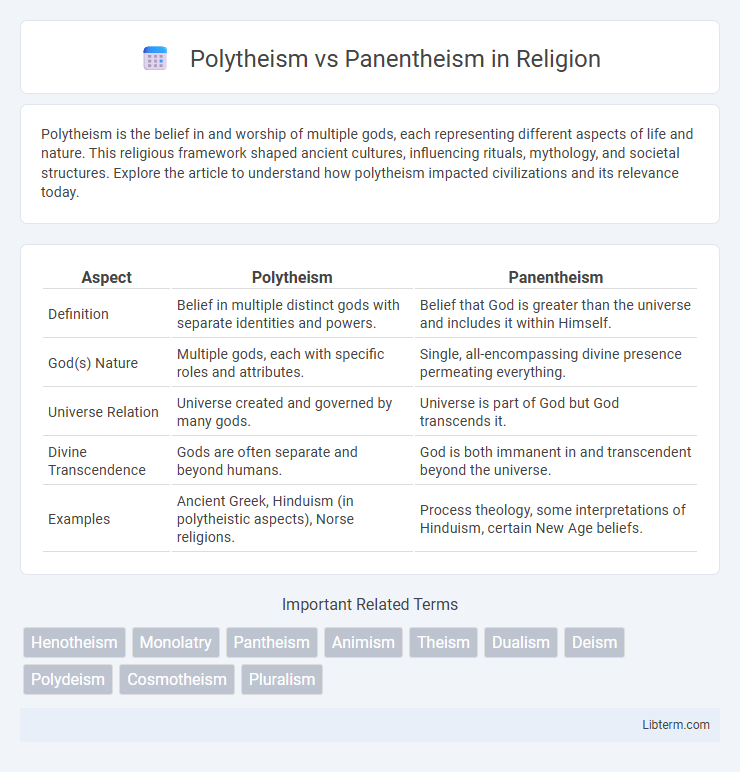Polytheism is the belief in and worship of multiple gods, each representing different aspects of life and nature. This religious framework shaped ancient cultures, influencing rituals, mythology, and societal structures. Explore the article to understand how polytheism impacted civilizations and its relevance today.
Table of Comparison
| Aspect | Polytheism | Panentheism |
|---|---|---|
| Definition | Belief in multiple distinct gods with separate identities and powers. | Belief that God is greater than the universe and includes it within Himself. |
| God(s) Nature | Multiple gods, each with specific roles and attributes. | Single, all-encompassing divine presence permeating everything. |
| Universe Relation | Universe created and governed by many gods. | Universe is part of God but God transcends it. |
| Divine Transcendence | Gods are often separate and beyond humans. | God is both immanent in and transcendent beyond the universe. |
| Examples | Ancient Greek, Hinduism (in polytheistic aspects), Norse religions. | Process theology, some interpretations of Hinduism, certain New Age beliefs. |
Understanding Polytheism: Core Concepts
Polytheism centers on the belief in multiple distinct deities, each embodying specific aspects of nature, life, or cosmic principles, often worshipped independently or within a pantheon. Core concepts include divine multiplicity, anthropomorphism, and the hierarchical relationships among gods, highlighting a complex system of mythologies and rituals unique to various cultures such as Ancient Greece, Hinduism, and Norse traditions. This framework contrasts with panentheism by emphasizing separate divine entities rather than a single immanent presence pervading the universe.
Defining Panentheism: Key Principles
Panentheism defines the divine as both immanent within the universe and transcending it, suggesting that God interpenetrates every part of nature while also extending beyond it. Unlike polytheism, which worships multiple distinct gods with separate identities and powers, panentheism emphasizes a unified divine presence that encompasses and permeates all existence. Core principles include the inseparability of God and the universe, a dynamic relationship between the divine and creation, and an ongoing process of manifestation and transformation within the cosmos.
Historical Origins of Both Beliefs
Polytheism originated in ancient civilizations such as Mesopotamia, Egypt, and Greece, where multiple gods embodied natural forces and social order. Panentheism traces its roots to philosophical and religious traditions like Hinduism, Neoplatonism, and some Indigenous beliefs, emphasizing the divine presence both immanent in and transcending the universe. Historical development of polytheism is closely tied to mythologies and ritual practices, while panentheism evolved through metaphysical inquiry and spiritual interpretations of divinity's relationship to existence.
Divine Diversity in Polytheism
Polytheism emphasizes divine diversity through the worship of multiple gods and goddesses, each embodying distinct attributes, powers, and domains such as love, war, fertility, and wisdom. This multiplicity allows for complex narratives and rituals that reflect varied aspects of human experience and natural phenomena, reinforcing a pantheon where divinities interact dynamically. In contrast, panentheism posits a single divine essence permeating and transcending the universe, focusing less on individual deities and more on an all-encompassing spiritual reality.
The Immanence of the Divine in Panentheism
Panentheism emphasizes the immanence of the divine by asserting that God pervades every part of the universe while also transcending it, intertwining the sacred intimately with all aspects of existence. Unlike polytheism, which worships multiple distinct gods often with separate domains, panentheism views divinity as an all-encompassing presence both within and beyond the cosmos. This belief fosters a continuous divine interaction with the world, highlighting an inherent sacredness in all beings and natural phenomena.
Differences in Religious Practices
Polytheism involves the worship of multiple distinct deities, each often associated with specific rituals, temples, and festivals tailored to their unique attributes and narratives. Panentheism centers on the belief that the divine pervades and transcends the universe, leading to practices emphasizing meditation, unity, and inner spirituality rather than distinct worship rituals. Unlike polytheistic ceremonies focused on individual gods, panentheistic practices often promote a holistic spiritual connection with the cosmos as a single divine presence.
Philosophical Implications Compared
Polytheism posits multiple distinct deities with individual wills and personalities, influencing diverse aspects of the cosmos and human life, which raises questions about divine hierarchy and moral plurality. Panentheism asserts that the divine pervades and transcends the universe simultaneously, suggesting an interconnected reality where God and the cosmos are inseparable yet not identical, challenging traditional distinctions between creator and creation. Philosophically, polytheism invites pluralistic metaphysics and ethical relativism, whereas panentheism promotes a unified ontology and holistic ethics, impacting conceptions of transcendence, causality, and the nature of existence.
Notable Civilizations and Thinkers
Polytheism prominently shaped ancient civilizations such as Mesopotamia, Egypt, Greece, and Rome, with notable thinkers like Hesiod and Homer articulating complex pantheons of gods. Panentheism, though less widespread historically, is reflected in philosophical traditions such as Hinduism's Vedanta and the works of Baruch Spinoza, who conceived God as encompassing and interpenetrating the universe. The distinction between polytheistic gods as separate entities and panentheistic God as an all-encompassing presence influenced religious, metaphysical, and cultural developments across diverse societies.
Contemporary Relevance and Interpretations
Polytheism remains relevant in contemporary spirituality by offering diverse deities embodying multiple aspects of life, resonating with cultural pluralism and individual spiritual needs. Panentheism gains traction in modern ecological and philosophical discourse by emphasizing the interconnection between the divine and the universe, promoting environmental stewardship and holistic worldviews. Both frameworks influence current religious practices and ethical discussions, reflecting evolving interpretations of divinity in response to global challenges.
Polytheism vs Panentheism: Key Similarities and Differences
Polytheism and panentheism both recognize multiple divine forms but differ fundamentally in the nature of the divine's relationship to the universe. Polytheism worships distinct gods with specific attributes and domains, while panentheism posits that the divine pervades all aspects of the universe yet transcends it. This distinction highlights polytheism's focus on multiplicity of deities versus panentheism's emphasis on an all-encompassing, immanent divine presence that also exists beyond creation.
Polytheism Infographic

 libterm.com
libterm.com